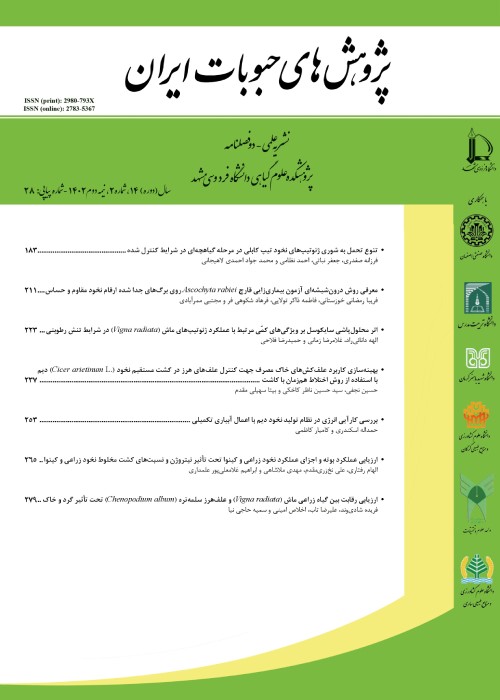Effect of compost fertilizer on antioxidant activity and physiological characteristics of lentil (Lens culinaris Medik) under water stress
Lentil (Lens culinaris M. cv. GACHSARAN) has a high percentage of protein content, in comparison with animal protein so it is an important food source especially for people on low incomes and in developing countries. Lentil is a crop grown all over the world and is compatible with different climatic conditions; from temperate to thermal and humid to arid. Water stress is the most critical environmental factor that limits crop production. Yield reductions reported from different parts of the world caused by drought stress average at more than 50%. Responses of plants to moisture deficiency in soil are different and depend on the intensity and period of stress. These responses are of two types: 1- Moisture deficiency in low intensity leads to transpiration reduction, disruption of water translocation from roots to shoots, reduction of the photosynthetic products which ultimately lowers crop and morphological traits. 2- Moisture deficiency in high intensity that produces reactive oxygen species (ROS) in plants; it has a detrimental effect on D1 protein of PSII, electron transport and production of high-energy molecules such as ATP and NADPH. In recent decades, bio-fertilizer appli Study on the effects of organic fertilizer such as compost demonstrated that using this fertilizer can increase nitrogen in the soil by about 42%, phosphorus by about 29% and potassium by 57% cation has become a common method for improving land affected by drought. In comparison with other organic fertilizers, compost consists of high levels of nutrients such as nitrogen, phosphorus, potassium, calcium and magnesium, as well as micronutrients such as iron, zinc, copper and manganese. Compost is rich in humic compounds and researchers speculate that the hormone-like activities of humic substances play a role in amelioration of water deficit stress. Agricultural land in Iran is facing water shortage and lentil is an economically valuable crop that has a significant role in the human diet. The aim of this study was to investigate reducing the negative effects of water stress with compost fertilizer application.
Materials & Methods
In order to evaluate the effects of compost fertilizer on physiological and biochemical indices of lentil under water stress, a factorial experiment based on completely randomized design was conducted with three replications in 2016 at the Khatam-Alanbia University of Technology. Treatments consisted of five levels compost fertilizer and soil ratio (0:100, 5:95, 15:85, 25:75 and 35:65) and three levels of water stress non-stress (75% of field capacity), moderate stress (50% of field capacity) and severe stress (25% of field capacity). The internal leaf CO2 concentration (ppm), net-photosynthesis (μmol m-2 s-1) and water-use efficiency (kg mm-1 ha-1) were measured on the central sector of the youngest fully-expanded leaf and non-detached young. Measurements were performed between 9:00 and 11:00 am using a portable infrared gas analyzer (KR8700 system; Korea Tech Inc. Suwon., Korea). Evaluation of the Fv/Fm ratio was determined for lentil plants using a portable chlorophyll fluorometer (Pocket PEA, Hansatech, Instruments Ltd., King’s Lynn, Norfolk, England). Proline assay was determined according to the method cited in of Bates et al. (1973). Leaf soluble protein was measured by the Lowry method. Peroxidase enzyme (EC 1.11.1.7, POX) activity was measured by Holy protocol. To measure activity of catalase enzyme (EC 1.11.1.6, CAT), the Candlee & Scandalios (1984) method was used. The method cited in Beauchamp & Fridovich (1971) was applied for measuring superoxide dismutase activity (EC 1.15.1.1, SOD).
All of the physiological traits were mainly affected by severe water stress. Results showed that under non-stress, compost fertilizer application (25 and 35 Wt %) resulted in a significant increase in all studied traits. Under moderate and severe stress, application of compost (35 Wt%) significantly increased RWC (3.3%, 6.17%), Cell membrane stability (5.4%), leaf CO2 consenteration (9.3%), net-photosynthesis (58.77%, 65.3%), WUE (12.13%, 22.47%), proline (3%), total protein (18.8%, 7.9%), POX (3.7%, 18.9%), CAT (3.7%) and SOD (1.3%, 12.5%). Compost containing high levels of nutrients, plant hormones, and with good water storage capacity leads to improved uptake of nutrients that serves to reduce the detrimental effects of drought stress. Humic and fulvic acids and other organic acids found in compost, as well as the frequency of nutrients, especially nitrogen can stimulate physiological traits.
In summary, due to the structural properties and mineral nutrients in compost it has several advantages compared to cultivation in the soil alone. This study demonstrated that the addition of compost to soil (25 and 35 Wt%) increased RWC, Cell membrane stability, leaf CO2 consenteration, net-photosynthesis, WUE, proline, total protein, POX, CAT and SOD. The use of compost in the soil increased N content of soil leads to increased proline and protein biosynthesis in plants, and these compounds have the role of protecting osmosis (compatible osmolyte) in water deficit conditions. Using the ratio of 35:65 (compost:soil) presented the most effective levels of compost for reducing the negative impact of water deficit stress.
- حق عضویت دریافتی صرف حمایت از نشریات عضو و نگهداری، تکمیل و توسعه مگیران میشود.
- پرداخت حق اشتراک و دانلود مقالات اجازه بازنشر آن در سایر رسانههای چاپی و دیجیتال را به کاربر نمیدهد.


